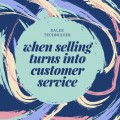To Sell is Human by Daniel Pink Book Review

Sales Dinosaurs
Selling, as we typically know it, is dead. The glad-handing, pushy, used car salesman stereotype and telemarketers are quickly going to become dinosaurs. Thanks to changing worldviews, economic challenges and the Internet, we all now have careers in sales. Delving into this new world of "everyone's a salesperson"--and what it can mean for your business and career--is the book To Sell is Human: The Surprising Truth About Moving Others by Daniel Pink.
The Evolution of Sales
A little background on me. I've been selling for the majority of my career, over 25 years in fact. Much of that time I was selling space. No, not the kind with stars (although that would have been interesting!). I sold hotel space, exhibit space at trade shows and advertising space... all intangibles. While all of these had a physical component to them, I was primarily selling the experience and the ability for a company to position themselves in front of a target audience.
What I was selling was quite different from that of the last remaining Fuller Brush man, Norman Hall, that Pink features throughout the book. Honestly, I was surprised that anyone was still direct selling Fuller Brushes, a household staple sold door-to-door! While Norman exhibits all the qualities you'd normally want to have in a salesperson--courtesy, perseverance, organization--his story is one of struggle. He keeps on keeping on, trudging the streets of San Francisco in the hopes of a few in-person sales. In common parlance, this would be known as "pounding the pavement."
Yet, as different as my product was from that of Norman's, I too have done my time on the roads visiting customers who were dramatically changing. One of the organizations I represented was committed to visiting print media advertising customers every month. I started working with them in the mid to late 1990s. Because I build relationships not just customers, most of my client base enjoyed our meetings and they benefited from me sharing my marketing advice with them. Then came 2008.
As early as 2005, customers were shifting their marketing budgets to email and websites. However, the market potential for what I was offering was still good. In fact, 2006 through 2008 were stellar sales years. But when our market collapsed in 2008, it was never to recover. I still was making the rounds, but it was getting harder and harder to meet people and the numbers reflected the reality. Then in 2012, the media organization that I represented closed their doors... forever. It was the end of an era.
Today, customers can find anything they want, be it a physical product or service, by using Google. As Pink notes:
In a world where anybody can find anything with just a few keystrokes, intermediaries like salespeople are superfluous. They merely muck up the gears of commerce...
So while the traditional salesperson is becoming extinct, a new type of "salesperson" is evolving.
When Everyone is in Sales
Want to hear a shocking stat? Pink notes that the U.S. Bureau of Labor Statistics reports that one out of every nine working Americans currently works in some sort of selling capacity. Wow! That's over 10 percent of the workforce. However, if Pink is right, that number is about to get a whole lot larger:
... today, much of what we do also seems to involve moving. That is, we're moving other people to part with their resources--whether something tangible like cash or intangible like effort or attention--so that we both get what we want.
Being the academic that Pink is, just stating that from observation wasn't enough. He teamed up with Qualtrics to conduct probably the first ever What Do You Do at Work? survey of over 9,000 respondents. Biggest findings? We're spending 40 percent of our workdays persuading, influencing and convincing others to take actions that don't involve exchanging goods, services and cash. And that's across all professions surveyed.
Indeed, we are all in sales.
This article is accurate and true to the best of the author’s knowledge. Content is for informational or entertainment purposes only and does not substitute for personal counsel or professional advice in business, financial, legal, or technical matters.
© 2013 Heidi Thorne






